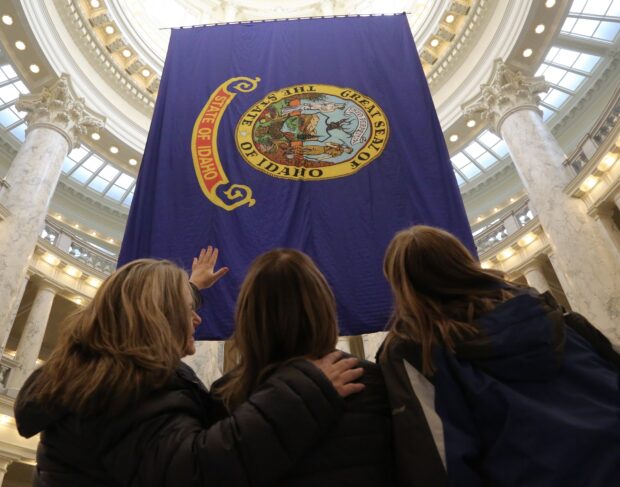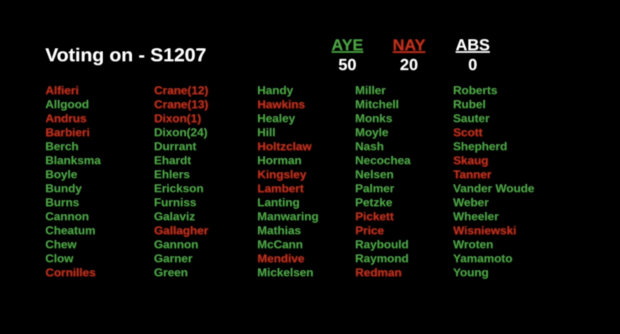With legislative leaders striving to wrap up the 2023 session by Friday, lawmakers continued to plow through K-12 budgets on both sides of the Rotunda Thursday.
The Senate also passed a controversial bill aimed at restricting access to “harmful” materials in public and school libraries.
The actions came during a long 81st day of the legislative session. It wasn’t the final day of the session; the Senate adjourned Thursday evening after passing the libraries bill, and the House adjourned soon after. Both houses will reconvene at 8:30 a.m. Friday, and could be close to adjourning the 2023 session.

Library pornography bill nears finish line
The Senate stamped its seal of approval on a bill restricting library collections Thursday night.
House Bill 314 seeks to ban harmful or obscene materials from public and school libraries. It is rooted in a concern that minors are being exposed to pornographic materials. The bill lays out a $2,500 fine for libraries found guilty of disseminating harmful materials.
The Senate amended the bill to bring it under the Idaho Tort Claims Act — a statute outlining the process for claims to be filed against government entities, like schools and public libraries.
The Senate’s debate ran nearly an hour, and was heated.
Democrats overwhelmingly agreed the bill is too far-reaching. Keeping tabs on a child’s book choices, said lawmakers, is a responsibility that should be left to parents.
“I shouldn’t have to raise my kids by the standards that you set in your home,” said Sen. James Ruchti, D-Pocatello, to proponents of HB 314.
Sen. Rick Just, D-Boise, said library collections are meant to serve everyone in the community, even when their views are unpopular. “There are things in libraries that offend me, as there should be.”
Sen. Geoff Schroeder, R-Mountain Home, said the possible $2,500 fine sets up libraries for a possible “bounty.”
“My whole beef with this bill is the enforcement mechanism,” said Schroeder, who had floated an amendment to remove the private cause of action clause, but it failed on the floor.
Sen. Ben Toews accused opponents of “downplaying and oversimplifying” the issue of library pornography. The Coeur d’Alene Republican recounted an experience with his own child, who found an “inappropriate” book in their local library on two occasions, even after the family asked the library to shelve the book in a different area.
And Sen. Chris Trakel brought a book he checked out through his 13-year-old daughter onto the floor. The book, “Let’s Talk About It” is a graphic novel described as a guide to sex and relationships for teenagers. Trakel planned on reading a passage of the book to the body, but refrained after a warning from leadership.
“I can’t read this here, but it’s OK for children to read it…that should close debate right here,” said Trakel, R-Caldwell.
After around an hour, the Senate voted to shut down the impassioned debate and skip to the final vote.
Schroeder and Sen. Linda Hartgen, R-Twin Falls, joined the seven Senate Democrats in voting against HB 314. The bill passed 26-9.
Because it was amended in the Senate, the bill will return to the House for final approval.
Legislature OKs teacher pay raises
A $1.3 billion teacher salaries budget easily cleared the Senate and House, after being held on the Senate floor for days.
The budget covers one of Gov. Brad Little’s goals for the 2023 session — pay raises for Idaho’s 17,500 teachers and 1,250 pupil service staff employees.
In January, Little announced his plan to boost Idaho’s starting teacher pay, in hopes of trying to vault Idaho into the top 10 in national rankings.
Senate Bill 1205 allocates nearly $145 million for teacher pay raises, calculated at $6,359 per full-time employee. The plan should raise the starting teacher salary to around $47,477.
The spending bill received support on the Senate floor, but senators were vocal about where they want the money to go — to teachers. Although the Legislature doles out the funds, teacher salaries are set by local school districts. Sen. Lori Den Hartog, R-Meridian, called on districts to follow through on the legislative intent.
“I hope our administrators and our school board members who are going to be at the negotiating table hear this loud and clear: It better get to every single teacher,” Den Hartog said Thursday during debate.
SB 1205 passed the Senate Thursday morning on a 33-2 vote. Sens. Brian Lenney, R-Nampa, and Dan Foreman, R-Moscow, opposed the bill. Neither spoke up during debate.
SB 1205 passed the House Thursday afternoon on a unanimous 69-0 vote, sending it to Little’s desk.
Of federal bucks and litter boxes: House passes K-12 budget bills
The House passed two of the K-12 budgets Thursday morning — after a free-wheeling and less-than-factual debate about federal spending.
The House’s debate centered on Senate Bill 1207, the K-12 children’s programs budget. The bulk of the $698.9 million budget comes from Uncle Sam, and specifically the COVID-19 relief money the feds directed to schools.
In essence, the state has already sent the money to Idaho schools — and it’s one-time money that districts and charters should use for one-time projects. “This is not something we’re going to come back and see in coming years,” said Rep. Britt Raybould, R-Rexburg.
And if school districts use the money for capital projects, such as new HVAC systems, it could reduce the need for local property taxes, said Rep. James Petzke, R-Meridian, SB 1207’s floor sponsor.
House conservatives were skeptical.
“There are lot of things going on that are going to create a lot of ongoing costs for us,” said Rep. Josh Tanner, R-Eagle. “Just throwing money around because it’s coming in is very irresponsible.”
Rep. Heather Scott, R-Blanchard, said the federal money comes with unwanted dictates — such as “litter boxes.” This was a brief reference to a refuted claim that schools are installing litter boxes in restrooms, for students who identify as cats.
“I think the federal government needs to stay out of local schools,” Scott said.
The bill passed on a 50-20 vote.

Minutes later, the House passed Senate Bill 1209, a $14.2 million central services budget funding items such as teacher training and content and curriculum.
Without debate, this budget passed on a 49-20 vote.
On Thursday afternoon, the House passed Senate Bill 1206, the K-12 operations budget. This $1.1 billion budget includes one big line item: $97.4 million in new money designed to help cover the cost of hiring and retaining classified employees, such as classroom paraprofessionals, bus drivers and cafeteria staff.
Without debate, this budget bill passed on a 54-15 vote.
All three budgets now go to Gov. Brad Little’s desk.
House passes higher education buildings package
The House OK’d a $185.2 million buildings budget that funds a variety of higher education projects.
Senate Bill 1197 contains $72.9 million for higher ed projects, which breaks down as follows.
- Boise State University: $17.9 million.
- College of Western Idaho: $15.7 million.
- College of Southern Idaho: $11.5 million.
- University of Idaho: $9 million.
- Idaho State University: $8.4 million.
- College of Eastern Idaho: $8 million.
- Lewis-Clark State College: $2.4 million.
Thursday evening’s debate was brief.
Rep. Josh Tanner, R-Eagle, restated an objection from the Joint Finance-Appropriations Committee’s debate over the bill. The higher ed money, parceled out based on enrollment, will require the state to cover the rest of the building costs later. “We now can no longer complete any of the projects.”
The bill’s floor sponsor, fellow JFAC member James Petzke, said the colleges and universities use other funding sources to augment state building dollars. “These projects are not usually fully funded within this budget,” said Petzke, R-Meridian.
The budget passed 43-25, and goes to Gov. Brad Little.
JFAC boosts funding for school property tax relief
Public schools stand to get an additional $20 million to put into property tax relief.
The Joint Finance-Appropriations Committee met Thursday morning to tie up loose ends from a new, far-reaching property tax relief law. In a unanimous vote, JFAC approved the additional $20 million for schools; it’s a piece of House Bill 380, a spending bill that passed the House unanimously Thursday afternoon.
The spending bill is a “trailer” to House Bill 292, the property tax relief law. In its original form, HB 292 sets aside $100 million for schools to use for property tax relief. They can use their share of the money to pay down bonds and levies, save up for future building projects, or bond against their state dollars to finance facilities.
The initial deposits into the new school district facilities fund will come from one-time state dollars. But starting on July 1, 2024, schools will receive 2.25% of state sales tax collections for ongoing payments into the school district facilities fund.
Based on current sales tax collections, that 2.25% share translates to about $61 million a year, said Keith Bybee, budget and policy analysis manager for the state’s Legislative Services Office.
HB 292 will provide a minimum of $225 million in property tax relief in December, Bybee said. But the law also contains what lawmakers call a “surplus eliminator.” If tax collections exceed forecasts, the excess money will go into property tax relief.
In 2024, the new law will translate into at least $121 million in property tax relief, and a minimum of $173 million in relief in 2025, Bybee said.
HB 380, which now goes to the Senate, might wrap up JFAC’s work for the session.
“We’re hopeful this is our last meeting,” said JFAC’s Senate co-chair, C. Scott Grow, R-Eagle. “You never know.”
Restraints bill gets final House approval
The House passed an amended version of House Bill 281, which bans corporal punishment in schools, and prohibits the use of restraint or seclusion as a form of discipline.
The House passed the bill on a 44-25 vote, sending it to the governor’s desk.
